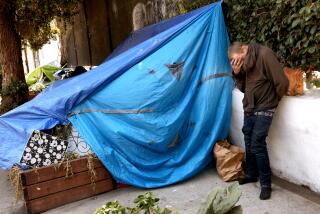Dream of Converting Motel to House Homeless Advances
In what migrant advocates have termed the first step toward a housing dream come true, state and county officials have tentatively recommended approving $475,000 in grants to convert an Encinitas motel into a low-cost housing project for the homeless.
But Encinitas city officials said Wednesday that they still have serious concerns about the scope and character of the plan, which has been criticized by local residents.
Recently, a state funding board recommended approving a $325,000 grant request from the Encinitas-based North County Chaplaincy, according to officials from the California Department of Housing and Community Development in Sacramento.
Later this month, the state housing director is expected to approve the recent decision by the state Local Assistance Loan and Grant Committee to put up the money through its Farm Worker Housing Grant Program.
And, in a decision that still must be approved by the Board of Supervisors, a county funding committee has also recommended approving a $150,000 grant for the estimated $3-million project to convert the 106-room Image Inn, on the east side of Interstate 5 in Leucadia.
The Rev. Rafael Martinez, executive director of the Chaplaincy, said Wednesday that the possibility of the grants fueled high hopes for the homeless project, but that more work needs to be done to see the center to reality.
“We’re getting the money little by little, and we still have a long way to go, but the hard part is that first half-million dollars, and we’re just about there,” Martinez said.
The Chaplaincy, one of the North County’s major support groups for migrant workers from Mexico and Central America, announced plans in May to purchase the financially ailing motel and convert it into a housing center for all kinds of homeless workers--including agricultural laborers.
The Image Inn was seized last fall by a Los Angeles bank, which later agreed to sell it to the Chaplaincy, which has paid a $25,000 deposit on the $2.8-million property. Another $75,000 must be paid by August, officials say.
Martinez said Wednesday that his plans for the homeless center include a meal service provided by area residents as well as educational programs.
Area residents have expressed opposition to the plan, and Martinez said he will meet with local groups soon to assuage their concerns.
“The first thing they have to realize is that this project is very different from building a dump or sewer project in the back yards,” he said. “These are human beings, working people. They’ll all employed. This isn’t any freebie program.
“The residents of the project will be working in area restaurants, offices, on construction and agricultural jobs. They’ll have a regular income but not enough to afford to buy or rent houses in the area.”
Many residents have expressed a fear that the center’s opening will attract prostitution and drug dealing, he said.
“We want to assure neighbors that this will not promote those kinds of activities,” he said. “There won’t be drinking, noisy people, thieves breaking into houses. We will have careful scrutiny of who is allowed in and a great deal of supervision.”
Martinez said the group will soon apply for a $100,000 grant from Encinitas city assistance programs. The rest of the $2-million price tag will come from low-interest loans.
“The more money we can get in grants, the less we will have to borrow,” Martinez said. “And that way we can keep the cost of each individual room down. But it’s important to have the support of the city in this project.
“I don’t think we can do it without them. We want their blessing, support and participation.”
While she has yet to meet with Martinez on the project, Encinitas Mayor Gail Hano said she has concerns that the scope of the center, which she says may include family and single-person units, will fail to comply with city zoning codes.
“We’ve heard that he is considering family units and, if so, we’re going to have to relook at this thing,” she said. City planners are studying regulations for single-resident occupancy dwellings citywide, Hano said.
“Those issues will have to be settled first,” she said. “We can’t go into this with all the unknowns. I’m getting an awful lot of flak from residents on this. They’re not at all fond of SROs.”
Martinez said he has no plans to put entire families in the center: “It will be two persons to a room. There will be no families, no eight to 10 people in one unit. That’s just imagination.”
Meanwhile, county housing analysts are pleased with the project and say it employs an unusual solution to meet a pressing need.
“It’s unique because it takes an existing structure and uses it for affordable housing,” said Michael McGuigan, a San Diego County housing program analyst. “And it has mixed use, not just for farm workers. It’s quite a unique package.”
In fact, the county Department of Housing and Community Development has offered itself as a secondary financing source if the project’s primary loan source falls through.
“I like any grant application that seeks to meet the needs of the homeless,” McGuigan said. “There’s such a desperate need.”
More to Read
Sign up for Essential California
The most important California stories and recommendations in your inbox every morning.
You may occasionally receive promotional content from the Los Angeles Times.











